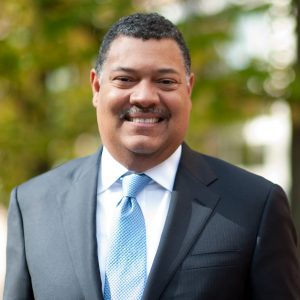Editor’s Note: In this BC Law Magazine “Vision Project” series, we are engaged in a lengthy discussion with Boston College Law School faculty about where the Covid-19 pandemic and its attendant medical, economic, racial, and political consequences may lead us. As New York Times op-ed columnist Timothy Egan so eloquently put it recently, “Every crisis opens a course to the unknown. In an eye-blink, the impossible becomes possible. History in a sprint can mean a dark, lasting turn for the worse, or a new day of enlightened public policy.” There are warnings and worries in these professors’ views, but there are also farsighted ideas and strategies for crafting a better future, a more just society, and a world in which each and every human being is equal under the law.
DEAN VINCENT ROUGEAU
Dean Rougeau is a vocal advocate for change in legal education and a leader in the fight for racial justice. He is President-elect of the Association of American Law Schools (AALS) and the recently named inaugural Director of the Boston College Forum on Racial Justice in America. Dean Rougeau is also an expert in Catholic social thought. His book Christians in the American Empire: Faith and Citizenship in the New World Order was released by Oxford University Press.

The killing of George Floyd has opened a new chapter on racism in America. How, from your legal perspective, might we use the lessons of this moment—and the rule of law—to create a better future for America and the world? In May, protests erupted around the United States in the wake of yet another savage killing of an unarmed black man at the hands of the police. Not even a global pandemic could check the progress of America’s racial disease. It is chronic. We treat the symptoms but we have been unable to cure the cancer for 400 years.
This time, however, it feels as if a dam has broken. The demonstrations are mostly peaceful and many of the protesters are white. This should not surprise us because racism disfigures every member of the society. Although black people are its most obvious and devastated victims, white people are forced to participate in a system created in their name, and are burdened with its “privileges” regardless of whether or not they perceive them.
On top of all of this, our country has been brought to its knees by a presidency that has shattered every norm of decency, comity, and civility that we have understood to be essential to the operation of our democracy. President Trump’s words and actions have become salt on our nation’s gaping wounds. During the protests in Washington, DC, his heavy-handed clearing of protesters and staging of photo opportunities before two prominent and historic churches drew widespread revulsion and sharp criticism from both the bishop of the Episcopal Diocese of Washington, Mariann Budde, and the archbishop of the Roman Catholic Archdiocese of Washington, Wilton Gregory, who happen to be the first woman and first African American, respectively, to hold their positions.
Archbishop Gregory found it “baffling and reprehensible that any Catholic facility would allow itself to be so egregiously manipulated and misused in a fashion that violates our religious principles, which call us to defend the rights of all people, even those with whom we disagree.” The archbishop reminds us of the very same values that animate our community at Boston College Law School, and signals to us what we are called to do in this moment.
What role do values play in all this and how can they help us reshape a more just democracy? We cannot continue to allow some in our society to dehumanize and divide us if we are to have any hope of preserving our democracy. The law is our best tool for reclaiming our country as a place where all people can participate in shaping our common life, and in which no one is simply an instrument for the acquisition of wealth or power by others.
America has erupted not only because of festering racism, but also because it is descending into oligarchy. The most meager attempts by ordinary people to have a voice in our government or to secure a modicum of economic security are ruthlessly attacked and derailed. We make it more difficult to vote than almost any other advanced democracy. We have a weak and ineffective social safety net that is on the brink of collapse. We still give political credence to the contemptible notion of the “deserving” and “undeserving” poor. We turn our backs on legitimate cries for help and justice from immigrants and refugees.
Those views are inimical to the values that built and have sustained Boston College Law School for close to 100 years. This law school will never retreat from its commitment to using the law to uphold the dignity of the human person, advance the common good, and promote compassion for the poor and the marginalized. A new opportunity to infuse the work we do as lawyers with those values has now presented itself. Our country is in desperate need of healing. Let us not lose this opportunity to attack, once and for all, the disease of racism while we build an economy and a democracy that serve all of us.
Read all faculty Vision Project interviews here.

